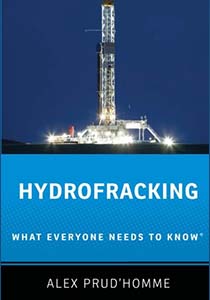HYDROFRACKING
What Everyone Needs to Know
Constantly in the news and the subject of heated debate worldwide, fracking is one of the most promising — and controversial — methods of extracting natural gas and oil from deep underground.
Constantly in the news and the subject of much public debate, fracking, as it is known for short, is one of the most promising yet controversial methods of extracting natural gas and oil. Today, 90 percent of natural gas wells use fracking. Though highly effective, the process-which fractures rock with pressurized fluid-has been criticized for polluting land, air, and water, and endangering human health.
A timely addition to Oxford’s What Everyone Needs to Know® series, Hydrofracking tackles this contentious topic, exploring both sides of the debate and providing a clear guide to the science underlying the technique. In concise question-and-answer format, Alex Prud’homme cuts through the maze of opinions and rhetoric to uncover key points, from the economic and political benefits of fracking to the health dangers and negative effects on the environment. Prud’homme offers clear answers to a range of fundamental questions, including: What is fracking fluid? How does it impact water supplies? Who regulates the industry? How much recoverable natural gas exists in the U.S.? What new innovations are on the horizon? Supporters as diverse as President Obama and the conservative billionaire T. Boone Pickens have promoted natural gas as a clean, “21st-century” fuel that will reduce global warming, create jobs, and provide tax revenues, but concerns remain, with environmental activists like Bill McKibben and others leading protests to put an end to fracking as a means of obtaining alternative energy. Prud’homme considers ways to improve methods in the short-term, while also exploring the possibility of transitioning to more sustainable resources-wind, solar, tidal, and perhaps nuclear power-for the long term.
Written for general readers, Hydrofracking clearly explains both the complex science of fracking and the equally complex political and economic issues that surround it, giving readers all the information they need to understand what will no doubt remain a contentious issue for years to come.
What Everyone Needs to Know® is a registered trademark of Oxford University Press.
Reviews
“Hydrofracking, by journalist/author Prud’homme, is primarily light reading for general readers; it might also serve as a supplemental resource for an introductory, nontechnical course on the subject. The mediocre discussion of this recently developed technical field may be beneficial to some students learning about petroleum production from shale formations. Most useful are the point/counterpoint discussions on the pros and cons of fracking; this content may be a source for student debates. Thoughts about the future of fracking and “beyond hydrofracking” round out the book, but this is, of course, only speculation, although it may foster good class discussions. The brief glossary may help some audiences. Very few of the references appear to be from technical sources, but instead are mostly from conventional news outlets. The references section lists numerous industry websites for readers to explore this topic further. Summing Up: Recommended. With reservations. General audiences and lower-division undergraduates. M. S. Field U.S. Environmental Protection Agency”
— Choice Review
“Drilling with hydraulic fracturing, known as hydrofracking or fracking, to extract oil and natural gas has become a contentious issue. Journalist Prud’homme (The Ripple Effect) seeks to clarify the situation. He points out that the technique is transforming energy use in North America. While conventional petroleum reserves are declining, shale formations are sites of a potential new gas bonanza. Coal-fired electric power plants are being replaced with cleaner gas plants. North American industry is more globally competitive as gas feedstocks become cheaper. If priced correctly, such abundant natural gas could become a “bridge fuel” to a renewable energy economy. Prud’homme expects that stricter EPA standards and technical improvements by energy corporations will make the process more acceptable; at the moment, he explains, the hydrofracking process consumes vast amounts of water, and the recycling or disposal of the wastewater is problematic. Because of the unknown composition of proprietary chemicals used, the monitoring and treating of groundwater near drill sites is hampered, and human and animal health may be affected. VERDICT This overview of hydrofracking and the bitter conflicts it causes will especially interest residents of states and provinces with shale oil and the potential for gas production”
— Publishers Weekly

Buy Now
To support independent stores in your community visit IndieBound. The book is also on sale at Amazon, and Barnes & Noble.